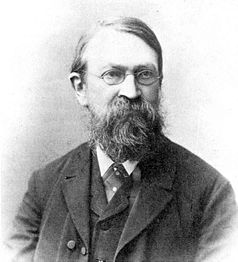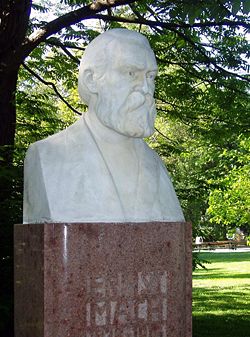Difference between revisions of "Ernst Mach" - New World Encyclopedia
Keisuke Noda (talk | contribs) (importing from wiki) |
Keisuke Noda (talk | contribs) m |
||
| Line 48: | Line 48: | ||
*[http://www.marxists.org/archive/lenin/works/1908/mec/ Vladimir Lenin: Materialism and Empirio-Criticism] | *[http://www.marxists.org/archive/lenin/works/1908/mec/ Vladimir Lenin: Materialism and Empirio-Criticism] | ||
| − | + | ||
| − | |||
[[Category:19th century philosophers|Mach, Ernst]] | [[Category:19th century philosophers|Mach, Ernst]] | ||
[[Category:Austrian philosophers|Mach, Ernst]] | [[Category:Austrian philosophers|Mach, Ernst]] | ||
[[Category:Austrian physicists|Mach, Ernst]] | [[Category:Austrian physicists|Mach, Ernst]] | ||
| − | |||
| − | |||
[[Category:Empiricists|Mach, Ernst]] | [[Category:Empiricists|Mach, Ernst]] | ||
[[Category:Historians of science|Mach, Ernst]] | [[Category:Historians of science|Mach, Ernst]] | ||
[[Category:Philosophers of science|Mach, Ernst]] | [[Category:Philosophers of science|Mach, Ernst]] | ||
| − | [[ | + | [[Category:Philsophy and religon]] |
| − | + | ||
| − | |||
| − | |||
| − | |||
| − | |||
| − | |||
| − | |||
| − | |||
| − | |||
| − | |||
| − | |||
| − | |||
| − | |||
| − | |||
| − | |||
| − | |||
| − | |||
| − | |||
{{credit|59808782}} | {{credit|59808782}} | ||
Revision as of 14:28, 3 July 2006
Ernst Mach (February 18, 1838 – February 19, 1916) was an Austrian-Czech physicist and philosopher and is the namesake for the "Mach number" (aka Mach speed,) and the optical illusion known as Mach bands.
Ernst Mach was born in Chrlice (now part of Brno), Czech Republic. He was educated at home until the age of 14, then went briefly to gymnasium before entering the University of Vienna at 17. There he studied mathematics, physics and philosophy, and received a doctorate in physics in 1860. His early work was focused on Doppler effect in optics and acoustics. In 1864 he took a job as professor of mathematics in Graz, in 1866 he was also appointed as a professor of physics. During that period Mach became interested also in physiology of sensory perception. In 1867 Mach took the chair of a professor of experimental physics at Charles University, Prague.
Mach returned to the University of Vienna as professor of inductive philosophy in 1895, but he suffered a stroke two years later and retired from active research in 1901, when he was appointed to the Austrian parliament. He continued to lecture and publish in retirement. Mach died on 19 February 1916 in Haar, Germany.
Physics
Most of his studies in the field of experimental physics were devoted to interference, diffraction, polarization and refraction of light in different media under external influences. These studies were soon followed by his important explorations in the field of supersonic velocity. Mach's paper on this subject was published in 1877 and correctly describes the sound effects observed during the supersonic motion of a projectile. Mach deduced and experimentally confirmed the existence of a shock wave which has the form of a cone with the projectile at the apex. The ratio of the speed of projectile to the speed of sound vp/vs is now called the Mach number. It plays a crucial role in aerodynamics and hydrodynamics. He also contributed to cosmology the hypothesis known as Mach's principle.
Sensory perception
In the area of sensory perception, he is best known for an optical illusion called the Mach band.
Philosophy of science
Mach developed a philosophy of science which was influential in the 19th and 20th centuries. Mach held that scientific laws are summaries of experimental events, constructed for the purpose of human comprehension of complex data. Thus scientific laws have more to do with the mind than with reality as it exists apart from the mind. Some quotations from Mach's writings will illustrate his philosophy. These selections are taken from his essay "The economical nature of physical inquiry", excerpted by Kockelmans (citation below).
- The goal which it [physical science] has set itself is the simplest and most economical abstract expression of facts.
- When the human mind, with its limited powers, attempts to mirror in itself the rich life of the world, of which it itself is only a small part, and which it can never hope to exhaust, it has every reason for proceeding economically.
- In reality, the law always contains less than the fact itself, because it does not reproduce the fact as a whole but only in that aspect of it which is important for us, the rest being intentionally or from necessity omitted.
- In mentally separating a body from the changeable environment in which it moves, what we really do is to extricate a group of sensations on which our thoughts are fastened and which is of relatively greater stability than the others, from the stream of all our sensations.
- Suppose we were to attribute to nature the property of producing like effects in like circumstances; just these like circumstances we should not know how to find. Nature exists once only. Our schematic mental imitation alone produces like events.
In accordance with this philosophy, Mach opposed Ludwig Boltzmann and others who proposed an atomic theory of physics. Since atoms are too small to observe directly, and no atomic model at the time was consistent, the atomic hypothesis seemed to Mach to be unwarranted, and perhaps not sufficiently "economical".
Mach had a direct influence on the Vienna Circle philosophers and the school of logical positivism in general. Albert Einstein called him the "forerunner of [the] Theory of relativity".
Mach's positivism was also influential on many Russian Marxists, such as Alexander Bogdanov. In 1908, Lenin wrote a philosophical work Materialism and Empirio-Criticism in which he criticized the views of "Russian Machists".
ReferencesISBN links support NWE through referral fees
- J. Kockelmans. Philosophy of science: the historical background. New York: The Free Press, 1968.
External links
Credits
New World Encyclopedia writers and editors rewrote and completed the Wikipedia article in accordance with New World Encyclopedia standards. This article abides by terms of the Creative Commons CC-by-sa 3.0 License (CC-by-sa), which may be used and disseminated with proper attribution. Credit is due under the terms of this license that can reference both the New World Encyclopedia contributors and the selfless volunteer contributors of the Wikimedia Foundation. To cite this article click here for a list of acceptable citing formats.The history of earlier contributions by wikipedians is accessible to researchers here:
The history of this article since it was imported to New World Encyclopedia:
Note: Some restrictions may apply to use of individual images which are separately licensed.


